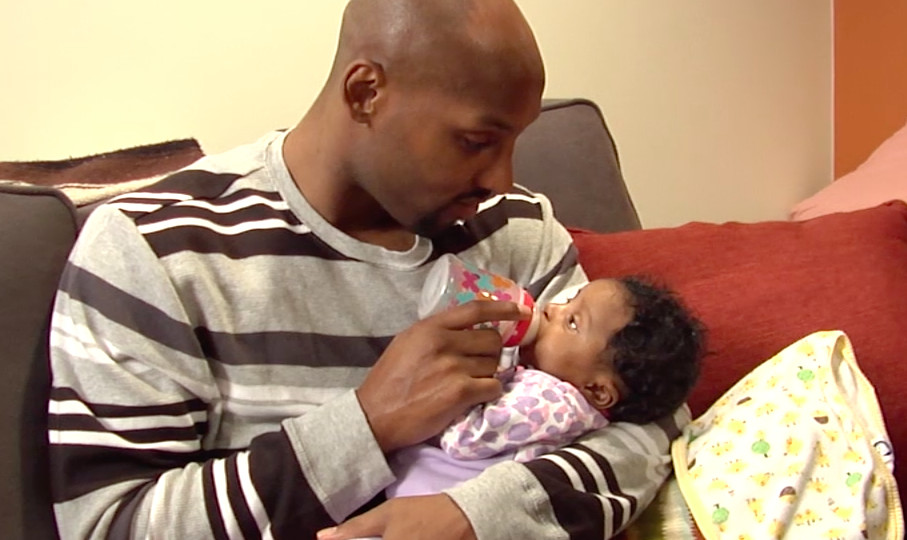Parent program only half as good without fathers
- August 14, 2017
- / Reggie Dogan
- / education

For nearly two months, the Studer Community Institute has been providing informative, engaging and entertaining Parent Outreach Program workshops to enhance and develop child-rearing skills and build babies’ brains through the power of words.
But the word “parent” is a misnomer.
Based on the participation of parents, the more apt term should be “Mother Outreach Program.” So far, only mothers — and grandmothers — have attended and participated in the sessions offered at Moreno Court and Attucks Court, even though they are open to any and all parents.
It’s a sad reality that way too often the father is missing in the family picture, leaving it up to the single mother to raise and nurture their babies and children.
Fathers are just as important to healthy child development as mothers. In an article, Psychology Today explained,” Fatherhood turns out to be a complex and unique phenomenon with huge consequences for the emotional and intellectual growth of children.”
Among the goals of the Studer Community Institute is to improve the community’s quality of life, and parent outreach and kindergarten readiness are important parts of them.
In Escambia County, more than 1,000 children each year start behind in kindergarten. This is a problem that has dire consequences for the children and our community. Poor performance in school is a leading cause of dropping out of high school. The downward spiral of a poor education includes higher crime, more teenage pregnancies, lower wages and loss of jobs.
Improving on this educational outcome is a part of becoming America’s first Early Learning City, a place in which all parts of the community is working as one to ensure every child is ready for kindergarten.
By building relationships with parents and families and creating partnerships with agencies, organizations and childcare providers, we want to give parents the training and the tools to aid in building their babies brains, which ultimately builds a life and build a community.
Parental involvement is broadly defined as “parental participation in the educational experiences of their children,” so it includes both school-based and home-based involvement.
For parents, involvement in their children’s education has been linked to increased parental confidence in, and satisfaction with, parenting, as well as increased interest in their own education.
Most parents want to be involved and engaged in their child’s learning, and many are able to establish and maintain ongoing and productive interaction with their children on a regular basis.
Research shows that nearly 85 percent of the brain is developed in a child’s first three years. We aim to make a difference for our children by equipping their parents with critical tools, skills and strategies to help build better brains and better lives.
The Parent Outreach Program is one of several initiatives created and designed to offer educational and informative lessons and activities to engage and involve parents.
Missing from the opportunity to benefit from the programs are the men, the fathers whose presence is just as important as the mothers.
Fathers matter a whole lot. The relationship between father and child has deep and lasting impact in children’s development — their language, thinking, physical and social-emotional growth.
Studies show us that fathers make a special and significant contribution to their children’s early development and lifelong success. Young children with involved fathers tend to be more patient and better able to handle stress and frustration once they are in school.
Children with involved fathers are less likely to experience depression, obesity, truancy, teen pregnancy and criminal involvement.
In Focus on the Family website, a blogpost “The Involved Father,” pointed out the distinctive differences between fathers and mothers.
Fathers communicate differently, play differently, discipline differently, providing a look at the world of men.
Men and women are just different. They eat differently. They dress differently. They cope with life differently. Girls and boys who grow up with a father are more familiar and secure with the curious world of men.
Girls involved, married fathers are more likely to have healthier relationships with the opposite sex because they learn from their fathers how proper men act toward women. They know which behaviors are acceptable and appropriate.
The importance of early education and the push to get more parents engaged earlier in their children’s academic and social development has become an important part of our mission. It is just as important for men to heard and be shown affection from their children as it is for women.
Children with involved, caring fathers have better educational outcomes. The influence of a father’s involvement extends into adolescence and young adulthood.
Fathers, in addition to mothers, should be included in family-intervention programs. A parent outreach program without both the mother and father is only half as effective as it could and should be.
 CivicCon launches with a look at good growth in cities
CivicCon launches with a look at good growth in cities
 Building stronger brains one baby, one parent at a time
Building stronger brains one baby, one parent at a time
 SCI debuts commercial on Early Learning City
SCI debuts commercial on Early Learning City
 Entrecon: World class speakers and an opportunity to sharpen skills
Entrecon: World class speakers and an opportunity to sharpen skills
 PYP Quality of Life survey 2017
PYP Quality of Life survey 2017
 EntreCon Pensacola 2016: A look back
EntreCon Pensacola 2016: A look back
 Leadership tip: getting better employee takeaways
Leadership tip: getting better employee takeaways
 Leadership tip: be interested instead of interesting
Leadership tip: be interested instead of interesting
 Leadership tip: delivering difficult messages
Leadership tip: delivering difficult messages
 Brain Bags boost Arc, Early Childhood Court programs
Brain Bags boost Arc, Early Childhood Court programs